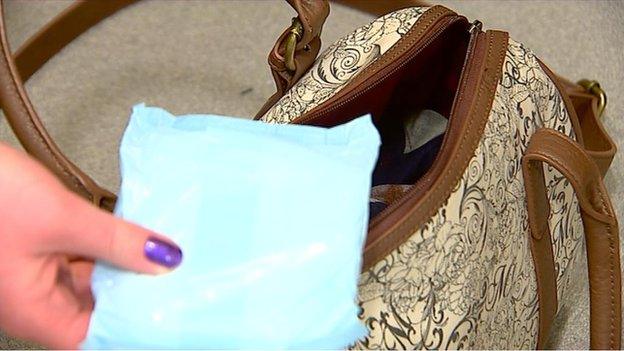Faulty implants end women's sex life
- Published
Shona Trainer said the pain was constant after having the mesh implant
Two women who were severely injured by commonly-used surgical implants have revealed their stories ahead of mass legal action against the manufacturer.
Both women have been told they can never have sex again after having a surgical device implanted to treat a prolapsed bladder.
The mesh implants hardened, causing injury to the women and potentially injuring their partners.
Hundreds of claims for damages are expected to be lodged.
Every year about 1,500 Scots undergo an operation to insert mesh or transvaginal tape.
The implants are commonly used to treat a prolapsed bladder and relieve incontinence, often as a result of childbirth.
'Linda', who wants her identity concealed, has been told there is nothing doctors can do for her.
She is in constant pain.
"I don't even go to the doctor, I don't bother," she said.
"I'm just in the house all the time."
"You can be sitting and you can feel the jagging pain. I can't even carry my washing. My husband has to carry it and if I put my hands up to put the washing on the line, I can feel it jagging."
"Sex is a no go," said Linda. "We've not got a sex life. It's actually taken a bit of toll on my marriage."

The implants are commonly used to relieve incontinence, often as a result of childbirth
Hundreds of claims for damages are expected to be lodged in Scottish courts over the coming months by women who have suffered complications after having mesh implants.
Lawyers said more women may have been injured by these devices than by faulty PIP breast implants.
Shona Trainer had a mesh implant in 2011 but was back at the doctors three months later because of the pain.
"It's constant. Constant from the waist down," she said.
Mrs Trainer had surgery four times to try to remove the mesh implant but each time the pain has returned.
"You go in thinking that they're competent enough to fix you and right now I'm worse than I was in the beginning," she said.
Studies looking at the safety of mesh implants and transvaginal tape found varying failure rates, with some finding very low levels of complications but others finding a failure rate of 15% for mesh implants.
However, a review by the Medicines and Healthcare products Regulatory Agency concluded that the benefits still outweighed the risks, especially as many of the women were suffering severe symptoms before surgery.

Some doctors say the benefits outweigh the risks
Mrs Trainer and Linda said they were now in much worse health.
"I wasn't in pain before I got the implant" said Linda.
"It was just a prolapse."
"We're left in the dark, absolutely left in the dark. There's something happening inside my body.
"What's it going to be like in another five years? I mean, it's not going to get better, it's going to get worse as the years go on."
Lawyers are pursuing compensation from a manufacturer of one of the implants and doctors who prescribed the procedure without properly informing women of the risks.
Hundreds of claims are due before Scottish courts in the next year.
"We just want to know why it's not regulated. That's our biggest question," said Lindsay Bruce from Thompsons Solicitors.
"Why are we seeing this time and time again in Scotland where it's not being regulated?
"Drugs have a licensing system and it's quite a stringent process to go through but medical devices just do not seem to have that, and something we want to know is, how are these even entering the market to be used on our clients?"
'No less stringent'
An expert group set up by the Scottish government to look at the issue of transvaginal mesh implants met for the first time in February.
The group is developing a revised information leaflet for use in the NHS in Scotland, which will be given to women in advance of under going the procedure.
It is aimed at ensuring women have better information about the use of mesh in order to be in a position to give fully informed consent.
A spokeswoman for the Scottish government added: "Scotland follows guidance produced by the Medicines and Healthcare products Regulatory Agency (MHRA) in exactly the same way as the other UK countries.
"There is absolutely no question of regulation in Scotland being any less stringent than any other parts of the UK and we liaise closely with the MHRA to ensure that is the case.
"MHRA are leading on the current review of EU legislation on medical devices. The Scottish Government is working with both MHRA and Department of Health on this review.
She added: "We have also set up the Scottish Cosmetic Interventions Expert Group, to review the recommendations contained within the Keogh Report and how they affect Scotland."